The president’s State of the Union address came straight from the heart of Crazytown. It had everything—tears, cheers, spectacle. They handed out medals and honors like Oprah in the early 2000s: “You get a car! Everybody gets a car!” At one point I thought he was going to pull out a ceremonial sword and knight Kristi Noem. There was yelling and booing and people crying, it was big and rousing, boring and absurd. And important in some things it revealed.
Ten years in, and Democrats still don’t know how to handle Donald Trump. He used them as foils and they allowed it, sitting there snarling, at points screaming. Part of how to handle him is if he tries to manipulate you into doing the right thing—if, for instance, he challenges you to stand in respect for a mother mourning the murder of her daughter—you put aside that you’re being manipulated and stand. Because it is right to show human sympathy and regard. The thing to do is look better than Mr. Trump, not worse. You say: My base demands coldness. Then get a new base. If you can’t, leave before you are reduced to a soulless husk of the eager, happy person who walked into that chamber a decade ago.

The speech left the president in better shape than he started it. We have all seen the polls. His ratings have tanked. He spent the beginning of his presidency with foreign preoccupations—Greenland, bombing Iran’s nuclear sites, literally picking up and removing Nicolás Maduro and telling Venezuela to find someone better. When Mr. Trump moved his attention to domestic issues, he tore down the East Wing of the White House and left a gaping hole of hanging pipes and torn-out wires; it looked as if Washington had been bombed. He sent heavily armed and apparently unaccountable officers to pull frightened people out of their homes, and two protesters were shot to death.
Americans don’t like these things. They will never like them.
Bubbling in the background was inflation, and behind that the coming destabilizations of artificial intelligence, so the president is in deep trouble. The only question has been by how much the Democrats will win the House in November, and do they have a chance in the Senate?
The sanest, coolest thing about all this was said by Melissa DeRosa on Mark Halperin’s “2WAY” podcast: “Dems are winning because Republicans are losing, and Republicans are losing because America feels chaotic now.”
In the speech Mr. Trump, as only he would, decided to calm things down and make them less chaotic by . . . giving constant jolts of electricity. But the electric jolts were largely positive. It was a speech whose subtext was about how great the American people are, examples of which he spread throughout the evening, not clumping them all at the end, which allowed him to brag personally for long stretches but then break it up, shifting to the excellence of others. This produced an effect of narcissism leavened by good-heartedness.
When the gallery doors swung open and the triumphant U.S. Olympic men’s hockey team marched in, it was vulgar and fabulous. They were wearing their medals and their Ralph Lauren sweaters and smiling and laughing like good young men. We all think we’re above theatrics. Perhaps you had a moment like this: You were home on the couch and you saw the guys bounding in and thought, “I am sophisticated, I know what they’re doing, they’re manipulating me, but I’m not some rube, I’ll watch clinically. Oh Jeez, Jack Hughes’s tooth is still broken, God bless him. The goalie’s chewing gum like some 1945 GI.” And your throat hitched up against your will and your eyes moistened and when they started with “USA! USA!” you gave up, gave in, and pumped your fist. It is a damnable fact of life that great propaganda works even when you know it’s propaganda.
Mr. Trump then hit hard at cultural issues that have more support in the polls than he has. In doing this he reminded a not insignificant portion of voters that no matter how much they dislike him, they dislike Democratic policies more. They don’t hate Democrats, but things that party allows or sits silent for.
All politics, even in the brazen age of egomania, comes down to policy. “I will raise taxes.” “I will lower them.” “Boys can play on the girls’ team.” “No boys on the girls’ team.” “If the Democrats win, they’ll open the border again.” “If the Republicans win, it will stay closed.”
Mr. Trump brought back his social issues—immigration, transgenderism, crime. Most potent was the story of Iryna Zarutska, the 23-year-old woman murdered last August in Charlotte, N.C. She had legally migrated here with her family from Ukraine and was working in a pizzeria. Her story haunts me, haunts a lot of people. She was brand-new here, innocent of America, and died by herself in terror on a train seat, her throat slashed; the last thing she saw was the towering man, her blood dripping from his knife.
It haunts us because in the way of life the obscure judges and court officers and prosecutors and legislators who let it happen are all fine, their lives undisturbed, but the girl is dead and the man who killed her had been arrested more than a dozen times before the stabbing, and had a criminal record going back to 2007. He never should have been free to do what he did.
On the president’s giving out of honors: You shouldn’t formally award the Medal of Honor at a State of the Union address because you cannot give our greatest national honor at what is, always and inevitably, a political and even partisan event. The Medal of Honor is above politics. It speaks of nation, not party. You don’t use brave men like that as your prop. You don’t insinuate yourself into their valor. A person would be churlish not to be moved by the two recipients’ stories Tuesday night, but awarding them what they’d earned in that venue marked the abuse of a great honor.
As for the Presidential Medal of Freedom, which Mr. Trump awarded to goalie Connor Hellebuyck, that august honor has been diminished in the past 10 years, Mr. Trump starting the trend and Joe Biden enthusiastically continuing it.
The Medal of Freedom isn’t for a moment, it is for a life. From its modern inception in 1963, it was the nation’s highest peacetime civilian honor for those who had traveled a long road and given our country something great. It was intended for the greatest American artists, scientists, entertainers, writers, thinkers—Robert Frost, John Ford, Jonas Salk. It went to Jesse Owens in 1976—40 years after he showed Adolf Hitler up at the 1936 Olympics. He was given it not for an instant but for a lifetime of constructiveness.
Why does this matter? Because it matters! Because this honor isn’t a matter of passing public mood or political need, it speaks of deliberation, it marks a nation recognizing, with wisdom and time and through the instrument of a president, who really helped us live.
There is nothing about the devaluing of this award that makes America great again.
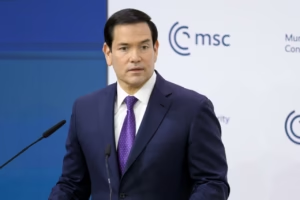

 Gathering anxieties seemed to come to the fore this week. AI people told us with a new urgency that some big leap has occurred, it’s all moving faster than expected, the AI of even last summer has been far surpassed. Inventors and creators are admitting in new language that they aren’t at all certain of the ultimate impact.
Gathering anxieties seemed to come to the fore this week. AI people told us with a new urgency that some big leap has occurred, it’s all moving faster than expected, the AI of even last summer has been far surpassed. Inventors and creators are admitting in new language that they aren’t at all certain of the ultimate impact.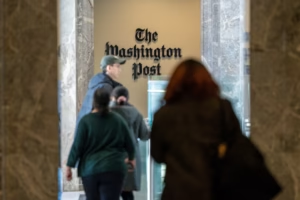 The Post was a pillar. The sweeping layoffs and narrowing of coverage announced this week followed years of buyouts and shrinking sections. None of this feels like the restructuring of a paper or a rearranging of priorities, but like the doing-in of a paper, a great one, a thing of journalistic grandeur from some point in the 1960s through some point in the 2020s. I feel it damaged itself when, under the pressure of the pandemic, George Floyd and huge technological and journalistic changes, it wobbled—and not in the opinion section but on the news side. But I kept my subscription because that is a way of trusting, of giving a great paper time to steady itself. (And there would always be an important David Ignatius column, or a great scoop on some governmental scandal that made it worth the cost.)
The Post was a pillar. The sweeping layoffs and narrowing of coverage announced this week followed years of buyouts and shrinking sections. None of this feels like the restructuring of a paper or a rearranging of priorities, but like the doing-in of a paper, a great one, a thing of journalistic grandeur from some point in the 1960s through some point in the 2020s. I feel it damaged itself when, under the pressure of the pandemic, George Floyd and huge technological and journalistic changes, it wobbled—and not in the opinion section but on the news side. But I kept my subscription because that is a way of trusting, of giving a great paper time to steady itself. (And there would always be an important David Ignatius column, or a great scoop on some governmental scandal that made it worth the cost.)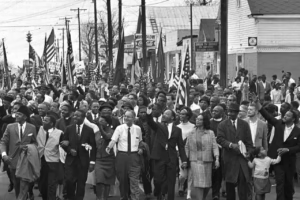
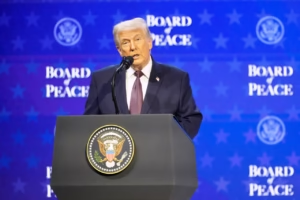
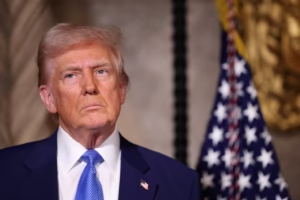 I queried acquaintances of mixed political disposition: What have you seen of Donald Trump the past year that is different from his first administration?
I queried acquaintances of mixed political disposition: What have you seen of Donald Trump the past year that is different from his first administration?
 Gallantry never says it won.
Gallantry never says it won. The second anecdote is also from a conversation, at a professional gathering in Arizona in the fall of 2023. One night at dinner I sat across from a brilliant and accomplished young man in his 40s who writes music, including movie scores. He was from Los Angeles, chic and hip and thoughtful. I shared a recent favorite score, the one written by John Adams for Luca Guadagnino’s “I Am Love.” Then our talk took a turn. For a while I’d puzzled over something and hadn’t had anyone with his background and expertise to ask about it.
The second anecdote is also from a conversation, at a professional gathering in Arizona in the fall of 2023. One night at dinner I sat across from a brilliant and accomplished young man in his 40s who writes music, including movie scores. He was from Los Angeles, chic and hip and thoughtful. I shared a recent favorite score, the one written by John Adams for Luca Guadagnino’s “I Am Love.” Then our talk took a turn. For a while I’d puzzled over something and hadn’t had anyone with his background and expertise to ask about it.